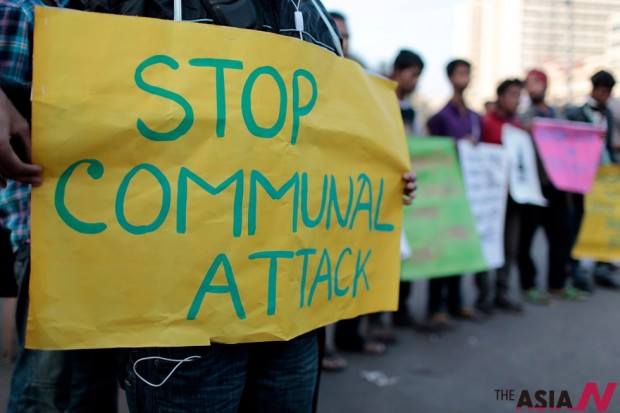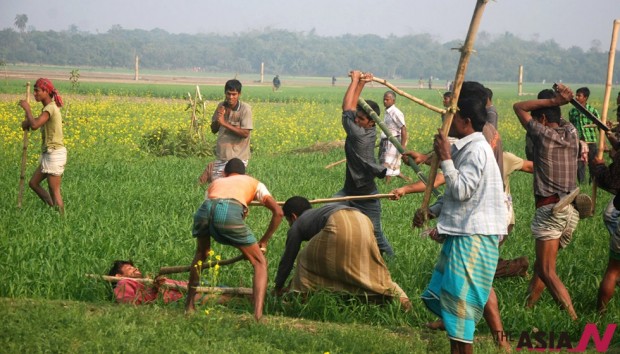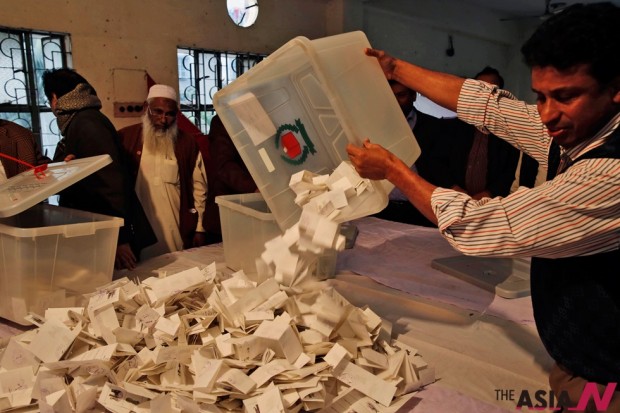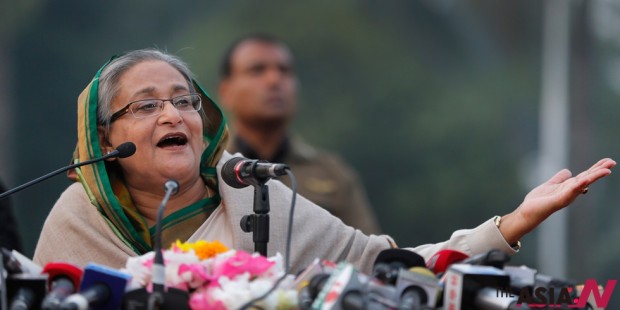Hasina wins election: political conflict persists

Bangladeshi activists hold placards while forming a human chain protesting against communal attacks during an ongoing strike called by the main opposition Bangladesh Nationalist Party (BNP) in Dhaka, Bangladesh, Jan. 8, 2014. (Photo: AP/NEWSis)
The Bangladesh Awami League (AL) president Sheikh Hasina has become the prime minister of the government again for the third time, as her party has achieved massive victory in the just-concluded parliament elections. The AL secured 232 seats in the 300-seat unicameral Jatiya Sangsad (parliament).
Sheikh Hasina, who was sworn in as Prime Minister on January 12, formed her 49-member council of ministers by inducting lawmakers of four other parties into her cabinet. Three lawmakers belonging to Jatiya Party (JP), which has 33 seats in the parliament, are in the cabinet. The JP will also act as the opposition in the parliament while Hasina described her new cabinet as the ‘government of consensus.’
The elections of the 10th parliament of Bangladesh held on January 5 was boycotted by the main opposition, Bangladesh Nationalist Party (BNP) headed by former Prime Minister Begum Khaleda Zia, who is leading an alliance of 18 political parties including the Islamic fundamentalist party Jamaat-e-Islami. The BNP-led alliance had not only boycotted the polls, but also tried to resist it through hartals (general strikes), blockades and violence.
The Election Commission (EC), however, succeeded in holding the polls in which 40.56 percent of voters turned out to cast their ballots. The turn out rate was described by both AL chief Sheikh Hasina and Chief Election Commissioner Kazi Rakibuddin Ahmad as satisfactory, since according to them, the elections were held amidst boycotts and violence of major opposition parties.

In this Jan. 5, 2014 photo, Bangladeshi opposition party activists beat a ruling Awami League party activist during a clash near a polling station in Rajshahi, northwest of Dhaka, Bangladesh. (Photo: AP/NEWSis)
A total of 12 registered political parties including the Awami League and its allies participated in the polls. Some 153 candidates, mostly belonging to the AL, were elected unopposed as they had no rivals during the elections for the 147 seats on January 5.
The BNP and its allies rejected the polls results and demanded fresh polls due to alleged rigging. The opposition vowed to continue their movement against Hasina’s government. A total of 22 persons were killed during the polls and post-poll violence was present across the country.
On January 6, the day after the polls, Sheikh Hasina addressed a press conference and expressed her satisfaction at the outcome of the elections. She claimed the polls as free and fair and said a 40.56 percent turn out of voters in a situation created by the opposition, is good enough.
Opposition boycotts the polls
Sheikh Hasina urged opposition leader Khaleda Zia for talks on the peaceful holding of the next elections for the 11th parliament. She called upon Khaleda to come for talks discarding the path of terrorism and violence and severing ties with war criminals of 1971 and militant Jamaat-e-Islami. “A solution could be reached on the next elections only through talks and for that everyone will have to have restraints, tolerance and stop political violence of all sorts,” Hasina said.
The demand, for which the opposition is agitating and boycotting polls, is the “holding of general elections under a non-partisan caretaker government.” But Sheikh Hasina rejected the demand saying, “Elections cannot be held under a government of unelected persons. The independent Election Commission would conduct the elections while the outgoing government should do the routine work of administration. This is the normal practice in the parliamentary system.”

An elections official empties a ballot box for counting in the general elections at a polling center in Dhaka, Bangladesh on Jan. 5, 2014. (Photo: AP/NEWSis)
But, Khaleda Zia remained adamant on her stance and declined to take part in elections if Hasina remained as Prime Minister. On this issue, the opposition has been agitating since November 25 when the EC announced the schedule of the elections for the 10th parliament. The opposition enforced hartals, blockades on highways, railways and waterways to put pressure on Hasina’s government. The opposition’s agitation programme often became violent, causing many losses to the country’s economy. Trains, motor vehicles, buses, trucks were burnt or damaged in many places including the capital city. Many lives were lost in the violence while hundreds sustained injuries.
The activists of fundamentalist Jamaat-e-Islami have been playing a key role in anti-government agitations. The registration of Jamaat as a political party with the Election Commission was earlier cancelled and its leaders are facing trials in the International Crime Tribunal in Dhaka for their crimes against humanity during the country’s war of liberation in 1971. The Jamaat-e-Islami collaborated with the Pakistani army during the war and now the party’s leaders are facing trials in the tribunal. One of the accused Jamaat, central leader Abdul Quader Mollah, has already been hanged while five other leaders have been sentenced to death and two others sentenced to imprisonment for life. In such a situation, Jamaat joined the alliance led by Khaleda Zia and its activists are playing the leading role in the agitation against Sheikh Hasina. The policy makers of the government believe that Jamaat is the main force in the opposition political alliance and therefore Sheikh Hasina has been asking Khaleda Zia to cut ties with Jamaat.
Economy: victim of political violence
Despite the opposition’s violent agitation, the Election Commission carried on with its polls schedule on January 5. While Sheikh Hasina is set to run the new government, Khaleda Zia has announced fresh programmes of movement demanding cancellation of January 5 polls and the holding of fresh elections. The country’s religious minority community Hindus have become a target of opposition activists and their houses and temples were attacked in many places. The Hindu community has become a target, since the opposition believes they voted for the Awami League.
The government has already deployed the army all over the country and law enforcing agencies have been asked to take stern action against those responsible for such attacks and violence. Sheikh Hasina also warned that severe action would be taken against those who are responsible for attacks on the minority community.

Bangladesh's Prime Minister Sheikh Hasina speaks during a press conference in Dhaka, Bangladesh on Jan. 6, 2014. (Photo: AP/NEWSis)
The worst sufferer in the recent political violence and agitation is the country’s business community and national economy. The general strikes and blockades seriously affected business and economic activities. The country’s exports have slowed down for the last couple of months, affecting export earnings. Bangladesh’s export earnings largely depend on readymade garments (RMG), but due to volatile situations, many orders from foreign buyers of RMG have been cancelled.
The country’s apex business body, the Federation of Bangladesh Chamber of Commerce and Industries (FBCCI), has appealed to both the government and the opposition to sit together and reach a consensus to settle political issues to save the country’s economy.
Meanwhile, UN Secretary-General Ban Ki-moon urged Bangladesh’s two major parties to resume talks after the elections and to urgently address the expectations of the people for an inclusive political process. In a statement issued on January 7, the UN chief said, “Violence and attacks on people and property can never be acceptable.”
Besides the UN Secretary-General and the country’s business community, AL chief and Prime Minister Sheikh Hasina also underscored the need for meaningful dialogue between the two sides for political settlements. The people of Bangladesh also expect a political solution ending all sorts of violence for the welfare of the people and protection of the country’s economy.



























































